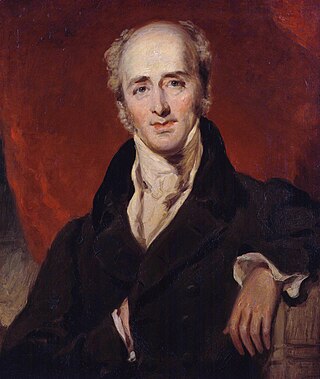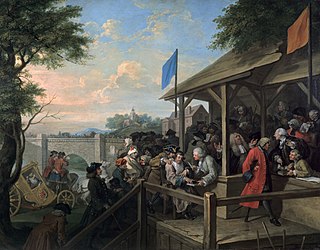Related Research Articles

"Unreformed House of Commons" is a name given to the House of Commons of Great Britain before it was reformed by the Reform Act 1832, the Irish Reform Act 1832, and the Scottish Reform Act 1832.

The 1831 United Kingdom general election saw a landslide win by supporters of electoral reform, which was the major election issue. As a result, it was the last unreformed election, as the following Parliament ensured the passage of the Reform Act 1832. Polling was held from 28 April to 1 June 1831. The Whigs won a majority of 136 over the Tories, which was as near to a landslide as the unreformed electoral system could deliver. As the Government obtained a dissolution of Parliament once the new electoral system had been enacted, the resulting Parliament was a short one and there was another election the following year. The election was the first since 1715 to see a victory by a party previously in minority.
Wiltshire was a constituency of the House of Commons of England from 1290 to 1707, of the House of Commons of Great Britain from 1707 to 1800 and of the House of Commons of the United Kingdom from 1801 to 1832. It was represented by two Members of Parliament (MPs), elected by the bloc vote system.

Abingdon was a parliamentary constituency in England, represented in the House of Commons of the Parliament of England until 1707, then of the Parliament of Great Britain from 1707 to 1800 and of the Parliament of the United Kingdom from 1801 to 1885. It elected one Member of Parliament (MP) from 1558 until 1983.
East Looe was a parliamentary borough represented in the House of Commons of England from 1571 to 1707, in the House of Commons of Great Britain from 1707 to 1800, and finally in the House of Commons of the United Kingdom from 1801 until its abolition in 1832. It elected two Members of Parliament (MP) by the bloc vote system of election. It was disenfranchised in the Reform Act 1832.
Bedfordshire was a United Kingdom Parliamentary constituency, which elected two Members of Parliament to the House of Commons of England from 1295 until 1707, then the House of Commons of Great Britain until 1801 and the House of Commons of the United Kingdom until 1885 when it was divided into two constituencies under the Redistribution of Seats Act 1885.
Derbyshire is a former United Kingdom Parliamentary constituency. It was a constituency of the House of Commons of the Parliament of England then of the Parliament of Great Britain from 1707 to 1800 and of the Parliament of the United Kingdom from 1801 to 1832. It was represented by two Knights of the Shire.
Berkshire was a parliamentary constituency in England, represented in the House of Commons of the Parliament of England until 1707, then of the Parliament of Great Britain from 1707 to 1800 and of the Parliament of the United Kingdom from 1801 to 1885. The county returned two knights of the shire until 1832 and three between 1832 and 1885.
Cornwall is a former county constituency covering the county of Cornwall, in the South West of England. It was a constituency of the House of Commons of England then of the House of Commons of Great Britain from 1707 to 1800 and of the House of Commons of the United Kingdom from 1801 to 1832. It was represented by two Knights of the Shire, elected by the bloc vote system.
Bristol was a two-member constituency, used to elect members to the House of Commons in the Parliaments of England, Great Britain (1707–1800), and the United Kingdom. The constituency existed until Bristol was divided into single member constituencies in 1885.
Ilchester was a constituency of the House of Commons of the Parliament of England, then of the Parliament of Great Britain from 1707 to 1800 and of the Parliament of the United Kingdom from 1801 to 1832. It was represented by two Members of Parliament until 1832. It was one of the most notoriously corrupt rotten boroughs.
Midhurst was a parliamentary borough in Sussex, which elected two Members of Parliament (MPs) to the House of Commons from 1311 until 1832, and then one member from 1832 until 1885, when the constituency was abolished. Before the Great Reform Act of 1832, it was one of the most notorious of England's rotten boroughs.
Liskeard was a parliamentary borough in Cornwall, which elected two Members of Parliament (MPs) to the House of Commons from 1295 until 1832, and then one member from 1832 until 1885. The constituency was abolished by the Redistribution of Seats Act 1885.
Gatton was a parliamentary borough in Surrey, one of the most notorious of all the rotten boroughs. It elected two Members of Parliament (MPs) to the House of Commons from 1450 until 1832, when the constituency was abolished by the Great Reform Act. Around the time of that Act it was often held up by reformers as the epitome of what was wrong with the unreformed system.
Nottinghamshire was a county constituency of the House of Commons of the Parliament of England then of the Parliament of Great Britain from 1707 to 1800 and of the Parliament of the United Kingdom from 1801 to 1832. It was represented by two Members of Parliament (MPs), traditionally known as Knights of the Shire.

Oxfordshire was a county constituency of the House of Commons of the Parliament of England then of the Parliament of Great Britain from 1707 to 1800 and of the Parliament of the United Kingdom from 1801 to 1885. It was represented by two Members of Parliament. In 1832 this was increased to three Members of Parliament. The constituency was abolished in 1885, being split into three single member divisions.
Norfolk was a County constituency of the House of Commons of the Parliament of England from 1290 to 1707, then of the Parliament of Great Britain from 1707 to 1800 and of the Parliament of the United Kingdom from 1801 to 1832. It was represented by two Members of Parliament. In 1832 the county was divided for parliamentary purposes into two new two member divisions – East Norfolk and West Norfolk.
Staffordshire was a county constituency of the House of Commons of the Parliament of England then of the Parliament of Great Britain from 1707 to 1800 and of the Parliament of the United Kingdom from 1801 to 1832. It was represented by two Members of Parliament until 1832.
Hertfordshire was a county constituency covering the county of Hertfordshire in England. It returned two Knights of the Shire to the House of Commons of England until 1707, then to the House of Commons of Great Britain until 1800, and to the House of Commons of the Parliament of the United Kingdom from 1800 until 1832. The Reform Act 1832 gave the county a third seat with effect from the 1832 general election.
Beaumaris was a parliamentary borough in Anglesey, which returned one Member of Parliament (MP) to the House of Commons of the Parliament of England from 1553, then to the Parliament of Great Britain from 1707 to 1800 and to the Parliament of the United Kingdom from 1801 to 1885, when the constituency was abolished. After 1832, the constituency was usually known as the Beaumaris District of Boroughs or simply the Beaumaris Boroughs.
References
- Edward Porritt, The Unreformed House of Commons - Parliamentary representation before 1832 (Cambridge University Press, 1903 - Reprint: Augustus M. Kelley, 1963) - Volume I - England and Wales - Volume II - Scotland and Ireland
- John Brooke, The House of Commons 1754-1790 (Oxford University Press, 1964)
- John Cannon, Parliamentary Reform 1640-1832 (Cambridge University Press, 1973)
- J.E. Neale, The Elizabethan House of Commons (Jonathan Cape, 1949)
- R.G. Thorne, The House of Commons 1790-1820 (Volume II, Constituencies) (Secker and Warburg, 1986)